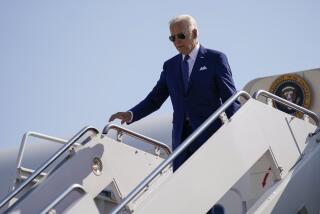Reagan Challenges Soviet Commitment on Pullout of Troops From Afghanistan
- Share via
Even as the Soviet Union nears the date for completing its withdrawal of troops from Afghanistan, its escalating bombing raids and introduction of new weapons “call into question the Soviet commitment to a peaceful solution” to the guerrilla war there, President Reagan said Tuesday.
Reagan, in a written statement issued on the ninth anniversary of the Soviet military intervention in the Central Asian nation, took the same hard-line approach that he has in years past, describing the Soviet invasion as “a brutal attempt to prop up an unpopular and authoritarian regime.”
“Today, we all know the outcome of this tragic mistake,” Reagan said. “Rather than achieving its aim, the Soviet action resulted only in destruction and continued suffering for the Afghan people.”
In Washington, the State Department issued a report Tuesday stating that Afghan government troops are demoralized and predicting that the Soviet-supported Afghan government would not be able to survive in Kabul, the Afghan capital, for very long after Moscow pulled out its troops.
In its annual report on the Soviet occupation of Afghanistan, the State Department stated that the military momentum in the war is shifting toward the resistance groups and that this trend “probably is irreversible.”
“Most observers believe that (Afghan President) Najibullah’s regime will not long survive the Soviet departure. It already has begun to unravel as party desertions increase and factionalism intensifies,” the report said.
In his statement, Reagan noted that the Soviets met the requirements of the agreement to withdraw half their troops--which had been estimated by U.S. officials at 115,000--by Aug. 15 under accords signed last April in Geneva.
“I fully expect them to honor their obligation to withdraw completely by Feb. 15,” Reagan said in the statement issued in Beverly Hills by the White House. He is spending a two-week Christmas and New Year’s vacation at his new home in Bel-Air and with friends in Palm Springs. At midday, he was driven from Bel-Air to Century City to inspect the offices he will use after he leaves the White House on Jan. 20.
Last month, the Soviets announced they were suspending their withdrawal from Afghanistan, citing U.S. arms shipments to the rebels and increased rebel attacks on civilians and troops. They have refused to confirm the final withdrawal date.
Reagan said more than 1 million people are believed to have been killed or injured in the nine-year Afghan war in which the moujahedeen guerrillas, aided by the United States, Pakistan and others, have sought to drive out Soviet forces and oust the Moscow-supported government.
“Even today, as Feb. 15 approaches,” the President said, “the Soviets continue offensive military operations in Afghanistan. The introduction of new weapons, and the escalation in the use of Soviet warplanes in bombing raids against Afghanistan call into question the Soviet commitment to a peaceful solution.”
Last May, the Soviet military commander in Afghanistan announced that the Soviet Union would leave behind “facilities and equipment” valued at $1 billion. At the time, Undersecretary of State Michael H. Armacost said the Soviets were rushing to deliver heavy equipment, such as armored fighting vehicles and transport aircraft, to Afghan government forces.
On Dec. 16, Charles Redman, the State Department spokesman, said Soviet air raids had increased since late October, and he expressed some “very strong concerns about what continues to be a very intense pattern of Soviet offensive activity.” He said that during the previous week, Soviet planes had conducted more than 100 sorties on most days.
The United States served notice at the time the Afghanistan accords were signed last spring that it would continue to supply arms to the guerrillas if the Soviets continued supplying the Kabul regime. Moscow and Kabul have complained repeatedly about the weapons flow to the guerrillas, directing the complaints mainly at Pakistan, through which the arms are funneled.
In his statement, Reagan vowed that U.S. support for the guerrillas “will continue as long as it is needed.”
“We have held that any decision about the government in a free Afghanistan will be--must be--the free choice of the Afghan people alone. With the end of foreign occupation, I am confident that the Afghan people will be able to take charge of their own affairs and get on with the formidable task of rebuilding their country,” the President said.
Times staff writer Jim Mann in Washington contributed to this story.
More to Read
Sign up for Essential California
The most important California stories and recommendations in your inbox every morning.
You may occasionally receive promotional content from the Los Angeles Times.













